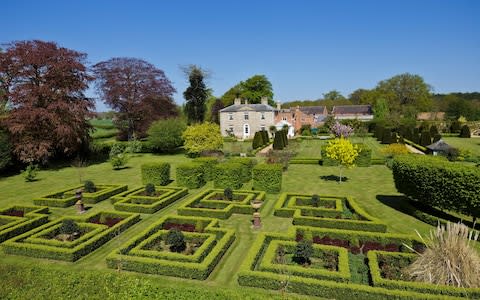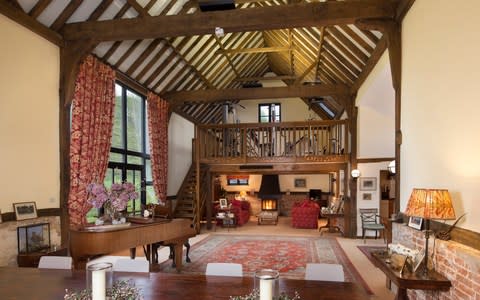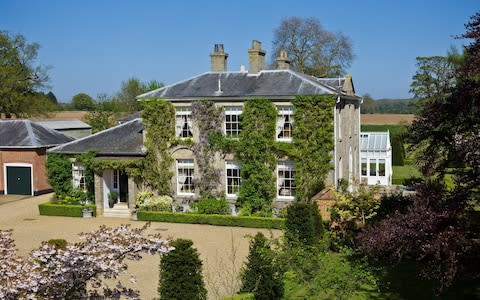The family selling their £31.5 million house: 'History is littered with people who have inherited estates and been miserable'

Towards the end of Michael Ondaatje’s novel The English Patient, Kip, an Indian Sikh sapper in the British Army, is tasked with defusing a bomb during the Nazis’ retreat through northern Italy. The tool he uses to successfully remove the fuse is name-checked as a “Quilter key”.
It was designed by Sir Raymond Quilter, who founded the GQ Parachute Company, which also came up with the static line system for deploying parachutes. During the Second World War, with volunteers from his factory, Sir Raymond started a bomb disposal unit and designed the Quilter key; it still forms a key part of bomb disposal tool kits today.
His grandson, Sir Guy, now stands at the helm of an altogether different enterprise: the 2,000-odd-acre Sutton Hall Estate, a largely arable farm near Woodbridge in coastal Suffolk. It cultivates cereals, potatoes and high-quality turf, some of which was used at Wembley Stadium. But a passion for aviation and an enterprising spirit still runs through the family’s veins.
Sutton Hall was once part of a much larger estate that was bought by Sir Guy’s great-great-grandfather Sir William (but known as Cuthbert) Quilter, a successful Victorian stockbroker. With his fortune he built Bawdsey Manor, a sprawling Victorian mansion where, according to the family, he added a tower every time he made another million. Not content with that, and by this stage having co-founded the National Telephone Company – which was the precursor to BT – Sir Cuthbert then proceeded to acquire further land and villages along the river Deben, eventually ending up with more than 8,000 acres, including Sutton Hall and its well-drained soil.

Sir Cuthbert handed the estate down to his son (another Cuthbert), who carried on the stockbroking tradition which provided much-needed funds for the estate.
But change was already in the air and the vast, property-based fortune was soon to be challenged by the taxes imposed following the First World War; Bawdsey Manor was sold to the Air Ministry in 1936. It became Britain’s first radar station and, having survived multiple Luftwaffe attacks, was an RAF base until 1990.
The Fifties proved difficult for the family with Sir Cuthbert and his son, Raymond, dying within seven years of each other. It fell to Sir Anthony, the father of Sir Guy, to meet the HMRC bill.
With estate duties running at 80 per cent, the deaths in such quick succession savaged much of the estate. There was no option other than to sell off the majority of the land, except for Sutton Hall and its 2,094 acres
“With estate duties running at 80 per cent, the deaths in such quick succession savaged much of the estate. There was no option other than to sell off the majority of the land, except for Sutton Hall and its 2,094 acres,” explains Sir Guy.
Today’s decision to sell up, which may raise eyebrows among those who favour primogeniture, mirrors the experience of Sir Guy’s father. Aged just 21, he was suddenly thrown in at the deep end to manage the estate.

“He had been studying at agriculture college but wasn’t expecting to take over the reins so soon.” History would go on to repeat itself a few decades later when Sir Guy was asked, aged 24, to take on the estate when his mother fell ill. “The farm manager retired the same day that I took over,” he adds.
Farming wasn’t Sir Guy’s original career choice; he was an officer with the Irish Guards. “I’d signed up for life but then had to come back,” he explains. Sir Guy was stationed in Berlin in 1989 when the wall came down and had already met his future wife, Jenny. The couple have three sons: William, 22, who has a passion for aviation and already holds his pilot’s licence, Henry, 21, and 19-year-old Oliver, who is a keen mountaineer.
For a few years, Sir Guy commuted into the City, carrying on the family tradition of stockbroking. “But I then decided to make the decision – a poor financial one but better lifestyle choice – to give up stockbroking and run the farm; I wanted to see the boys grow up.”

Both parents describe the childhood they gave them as very “Swallows and Amazons”; the estate owns almost three miles of the banks of the Deben. “It was a wonderful place to grow up with memories of the boys and their friends hurling themselves off our quay into the river,” says Lady Quilter.
During those years, the Quilters invested heavily in restoring and modernising the family farm, which benefits from an underground irrigation system.
“After my parents died, we started to think more about the future and whether or not we’d want to hand the estate over to one of the boys. We questioned whether we wanted to impose on them something that they might not want to do in terms of a career, and asked ourselves if that would be tantamount to curtailing future happiness.”

They are, adds Lady Quilter, “all very different and have their own individual passions and interests.”
Sutton Hall is now on the market for £31.5 million through Knight Frank. As for the children, and especially Will, the oldest, the decision to let it go wasn’t a great surprise.
“We used to say to him that he should go off and do something he wanted to do and not come back until he was in his 40s,” says Sir Guy.
“But the more we thought about it, the more we realised we want them to do something they truly love. History is littered with people who have inherited estates and either been miserable or unmotivated. By selling on, no one is left feeling that one has been luckier than the other. Every family is different, and we accept that. We just wanted to be really fair.”

 Yahoo Finance
Yahoo Finance 